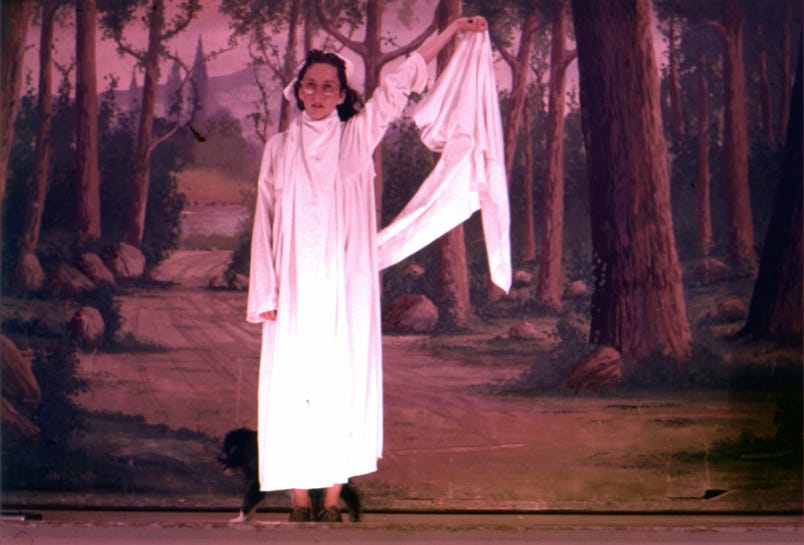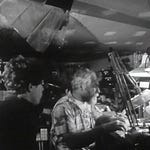(Text below excerpted from my book, THE FILMS OF RICK SCHMIDT 1975-2015)——
1988-THE REMAKE
“Director's Statement” by Co-Writer/Director Rick Schmidt. who discusses the making of Showboat 1988.
Almost 50 years ago, I used an American Film Institute grant to shoot a movie that took place in and around an audition, featuring a librarian (played by actor Ed Nylund – a librarian in real life) trying to remake the musical Show Boat. The fates took hold of what was intended to be a small affair. I originally looked into small community playhouse stages, expecting to shoot on some small stage with a melodrama unfolding. After I was unable to get access to a local playhouse, I ended up renting the cavernous California Hall, right on Polk Street in San Francisco. A poster for the filming, produced by my design friend Joe DiVincenzo, advertised for UNDISCOVERED. “Professional, Amateur, Strange, whatever your act is...” (catch-phrases he and his advertising buddies in San Francisco concocted).
The final ingredient, that packed hundreds of hopeful auditioners into the hall in San Francisco, was when Ant Farm collective member, Doug Michaels, who did a performance artwork called “Media Burn” earlier that summer in San Francisco (1975) with artists Chip Lord and Doug Hall, loaned me their media list, arming me and Joe with the most up-to-date media contacts for our Press Releases.
At the shoot, I eventually had a small army helping me––friends helping street people fill out and sign Movie Actor Releases forms at the door (I have over 1000 of these “permission” documents...), actors acting as “movie people.” playing their parts while sitting at a table with Ed, along with professional gaffers; techs lighting and changing camera rolls of 16MM film as I shot. Fortunately, an art patron friend saved the third and final shooting night, with a last-minute investment for more filmstock.
And the three co-scriptwriters (Henry Bean, William Farley, Nick Kazan), added their two- cents, helping me conceive scenes as well as entertaining their moral doubts about the auditioning process itself (see end "riot").
When the feature was finally completed–– three years of tortuous money-running-out editing later, and achieving a World Premiere at the prestigious Whitney Museum of art in NY, I was threatened by lawsuit from MGM and the estates of Jerome Kern, Oscar Hammerstein, and Edna Ferber. They objected to the use of some songs and my parody which, as actor Ed Nylund put it, must add "the stench of death to the musical comedy form” (Ed Nylund’s own concept, his words). (Scroll up to see FULL ‘censored’ version of movie).
MIKE MIDEKE (“BOOM MAN)” RECORDS SOUND.
This CENSORED VERSION was accepted at the London Film Festival later, in 1980 and was ultimately purchased by Channel Four in the UK, screening to 330,000 Londoners on a prime-time Friday night. Perhaps that's where it morphed into England's Got Talent, American Idol, The Gong Show, America/UK’s Got Talent, The Voice etc. (Just look for four judges at a table––same as my feature. And in each case, each reality TV showcase, there is one overly-abrasive judge––that’s our Showboat 1988 character, played to perfection by Skip Covington).
***
reviews for (Showboat) 1988-The Remake
“1988 in its cumulative preposterous flummery is a spirited outcry for people to throw off the covert and overt forms of oppression and be themselves. Beneath the film’s Quixotic humor and surprisingly touching pathos stands the surrealist belief that art is never more important than life. An outrageous tour-de-force.”––Vic Skolnick, CINEMA ARTS CENTRE
Lindo Montano.
“With this film the tradition of the independent cinema's mock-Hollywood humor is turned inside out.” ––B. Ruby Rich, CHICAGO READER
“It's the greatest extravaganza of the improbable, the bizarre, and the merely mediocre gathered together for the first time anywhere, anytime, on any stage.”––Tom Baglien, MINNEAPOLIS STAR
“Hollywood has made three versions of Show Boat boat, but none of them are remotely like SHOWBOAT 1988.” ––Bob Lundegaard, THE MINNEAPOLIS TRIBUNE
“The big hit of the Ann Arbor Film Festival, it’s easy to see why. The film has carved a unique niche for itself somewhere between FREAKS and Fellini's 8 1/2. It’s as though someone forgot to lock the studio door and Luis Bunuel and William Burroughs sneaked in and began a hatchet job on Hollywood."––David Harris, BOSTON PHOENIX
(Showboat) 1988 Co-lead actor, Carolyn Zaremba.
“The tryout sequences are both delicious and dismaying, reminding us in poignant moments of A Chorus Line and (more often) in silly moments of the tryouts in Mel Brooks' The Producers.”––David Elliot, CHICAGO SUN TIMES
“It could be a monster the way Variety uses the word, or the way Mary Shelley did.” ––Jon Carroll, VILLAGE VOICE
“Schmidt's cutting is right on the money, from news to color video to black and white. He spins around his various stories like a narrative Nureyev.”––Phil Anderson, MINNEAPOLIS READER
“The varied interpretations of Ol’ Man River reprised throughout support my hope that this ballad will some day replace The Star Spangled Banner as our national anthem.” ––J. Hoberman, VILLAGE VOICE
“The film raises questions about exploitation, entertainment, politics, psychology, and the nature of the medium itself.”––Michael Brown, BOSTON EVENING GLOBE
“It is almost guaranteed to be one of the most unusual and moving films ever made.” ––Susan Rumsey, ENTERTAINMENT NEWS
“Laugh more than you have ever laughed before...one of the discoveries of the festival.” ––FILM INTERNATIONAL FILM FESTIVAL, ROTTERDAM
“1988 recounts the fictitious tale of a middle-aged librarian’s attempt to finance and remake the film musical “Showboat” in contemporary terms. The auditions are arranged on a San Francisco stage, and range from incredible to merely bizarre.” —VARIETY
Performer of “Noise,” Darryl Goodman.
“The film was originally titled, Showboat 1988: The Remake. However, in answer to objections from Metro-Goldwyn-Mayer Inc., director Schmidt deleted all references to the play or novel (“Show Boat” by Edna Ferber). Schmidt actually staged open auditions in San Francisco’s California Hall for the alleged remaking of “Showboat.” As in “A Chorus Line,” the auditions are the heart of the story, except in “1988” those who try out are not just show-business types, they represent a microcosm of American society, from the elderly couple who dream of dancing on the “Lawrence Welk Show” to a bearded transvestite in a tutu. By saying: Write your own fantasies in celluloid,” the film examines our voyeuristic national tendency, which is evidenced by all those who want to appear on television game shows, of needing the validation of an audience in order to perform our lives. Unlike the material from which it borrows, “1988” strips away the structure of its fantasies, leaving the audience as well as the performers naked and vulnerable. Courage to those who can live without dreams.”
––Linda Gross, LOS ANGELES TIMES
————
“Showboat 1988 is a rough unfinished project that reanimates the sentimental tradition because its death or attrition would be a tragic blow to the collective life drive. The series of auditions the film stages run the gamut, affectively and generically speaking, A man mimics a garbage disposal and other sound effects from ordinary life that he says that he developed to entertain his unhappy mother; and angry punk refunctions “Ol Man River” (which keeps on rocking along) to reflect contemporary conditions of structural suffering and the rage of youth at corporate homogenization; drag and bio-women perform female complaints (“I’m just a housewife, a lonely housewife”); lesbians sharing a pair of pants sing romantic vaudeville ironically; the magnificently awkward come up one by one to declaim poems of birth, death and love; there is tap-dancing (a father with his young daughter; a man in a turtle suit; a woman in a nun’s habit who dances with her dog and strips while she taps). Little of this is expressive in any referential sense: the lyrics barely matter. The claim is in the body taking up time, and space. What is important is that many versions of nobodiness are revealed in their singular and yet generic, impersonal, non- autobiographical somebodiness.” ––Lauren Berlant, “THE FEMALE COMPLAINT, The Unfinished Business of Sentimentality in American Culture,” ©2008 Duke University Press (pages 265-279, “Overture/Aperture: Showboat 1988.
————-














